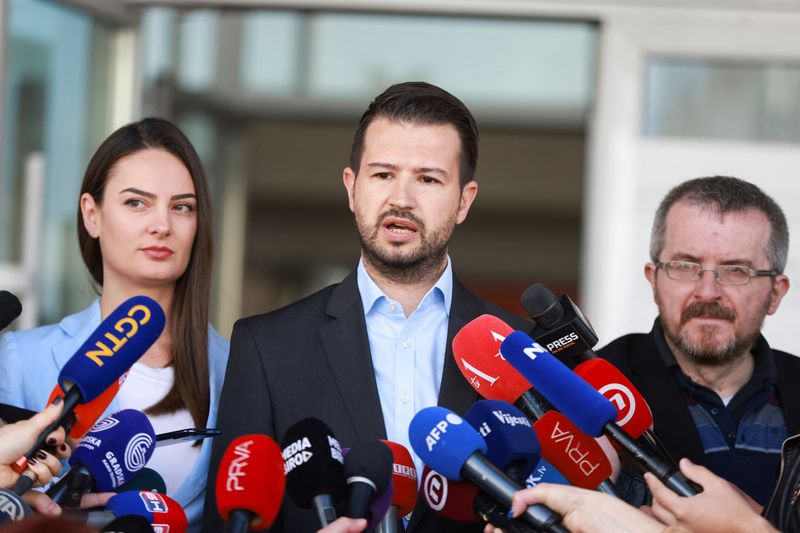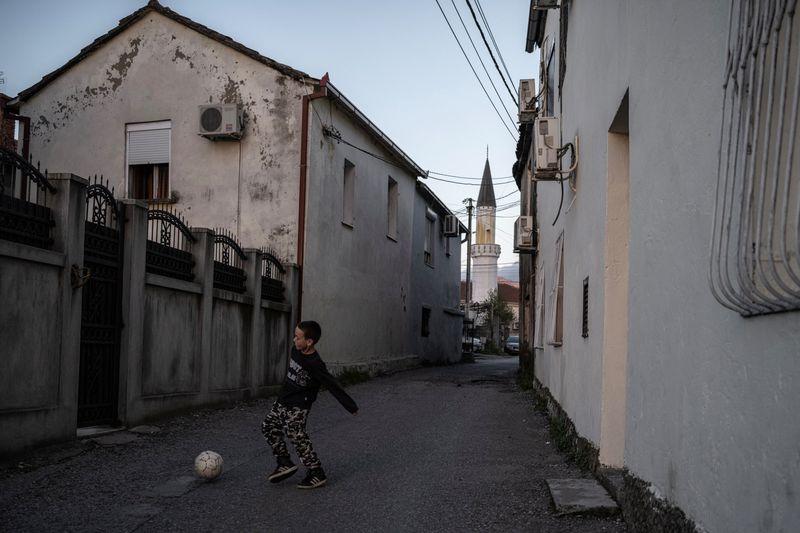By Aleksandar Vasovic
PODGORICA (Reuters) - Montenegro's former economy minister Jakov Milatovic declared victory in a presidential election run-off on Sunday, over long-standing incumbent Milo Djukanovic, ending more than three decades of his rule in the small Balkan republic.
Western-educated Milatovic, 37, the deputy head of the Europe Now movement, campaigned on pledges to curb graft, improve living standards and bolster ties with the European Union and fellow former Yugoslav republic Serbia.
"Tonight is the night we have been waiting for over 30 years. I wish you a happy victory," Milatovic told cheering supporters of his right-centrist Europe Now Movement in its party headquarters in Podgorica.
"Within the next five years, we will lead Montenegro into the European Union," he said.
In the capital Podgorica, some of his jubilant supporters drove through the centre, honking their car horns while others set off fireworks or fired guns into the air.
Djukanovic, 61, a former communist, has dominated Montenegro as president or prime minister for 33 years since the start of the collapse of the now-defunct six-republic Yugoslav federation. He conceded defeat to Milatovic.
"Montenegro has made its choice. I respect that choice and I congratulate Jakov Milatovic," Djukanovic, who will remain at his post until the handover on May 21, told his backers in the headquarters of his Democratic Party of Socialists (DPS) in Podgorica.
Milatovic won 60.1% to Djukanovic's 39.9%, the Podgorica-based Center for Monitoring and Research (CEMI) pollster said on the basis of results tabulated from a statistical sample of votes cast.
Another pollster, the Podgorica-based Center for Democratic Transition (CDT) also put Milatovic in the lead with 56.9%.
Voter turnout stood at about 70%, CEMI said.
The state election commission is expected to announce official results in the coming days, on the completion of complaints procedures.
Djukanovic led Montenegro to independence from a state union with much larger Serbia in 2006 and to NATO membership in 2017. The country is also a candidate to join the European Union.
Opponents accuse Djukanovic and the DPS of corruption, ties with organised crime and running the small Adriatic republic as their fiefdom - allegations they deny.
"You could see the force of a unified Montenegro tonight ... this is why it (the victory) is so big and so historical, tonight we have said a goodbye to crime and corruption in Montenegro," Milatovic said.
Sunday's vote follows a year of political instability in which two governments that came to power on the back of 2020 protests supported by the influential Serbian Orthodox Church, were felled by no-confidence votes.
It was also marked by a dispute between lawmakers and Djukanovic over his refusal to name a new prime minister.
"The people have sent a clear message they want changes and that the new political elite should be paying more attention to their (people's) problems and needs," said Milos Besic, a lecturer in political science at the University of Belgrade.
On March 16 Djukanovic dissolved parliament and scheduled snap elections for June 11. Although the presidential post in Montenegro is largely ceremonial, victory in the presidential election would bolster the chances of the winner's party in June.
Montenegro, which mainly relies on revenue from tourism along its scenic coast, has a legacy of bitter divisions between those who identify as Montenegrins and those who see themselves as Serbs and are opposed to the country's independence.

The country joined NATO after a 2016 coup attempt that the Djukanovic government blamed on Russian agents and Serbian nationalists. Moscow dismissed such claims as absurd.
After Russia's invasion of Ukraine last year, Montenegro joined EU sanctions against Moscow and expelled a number of Russian diplomats. The Kremlin has placed Montenegro on its list of unfriendly states.
